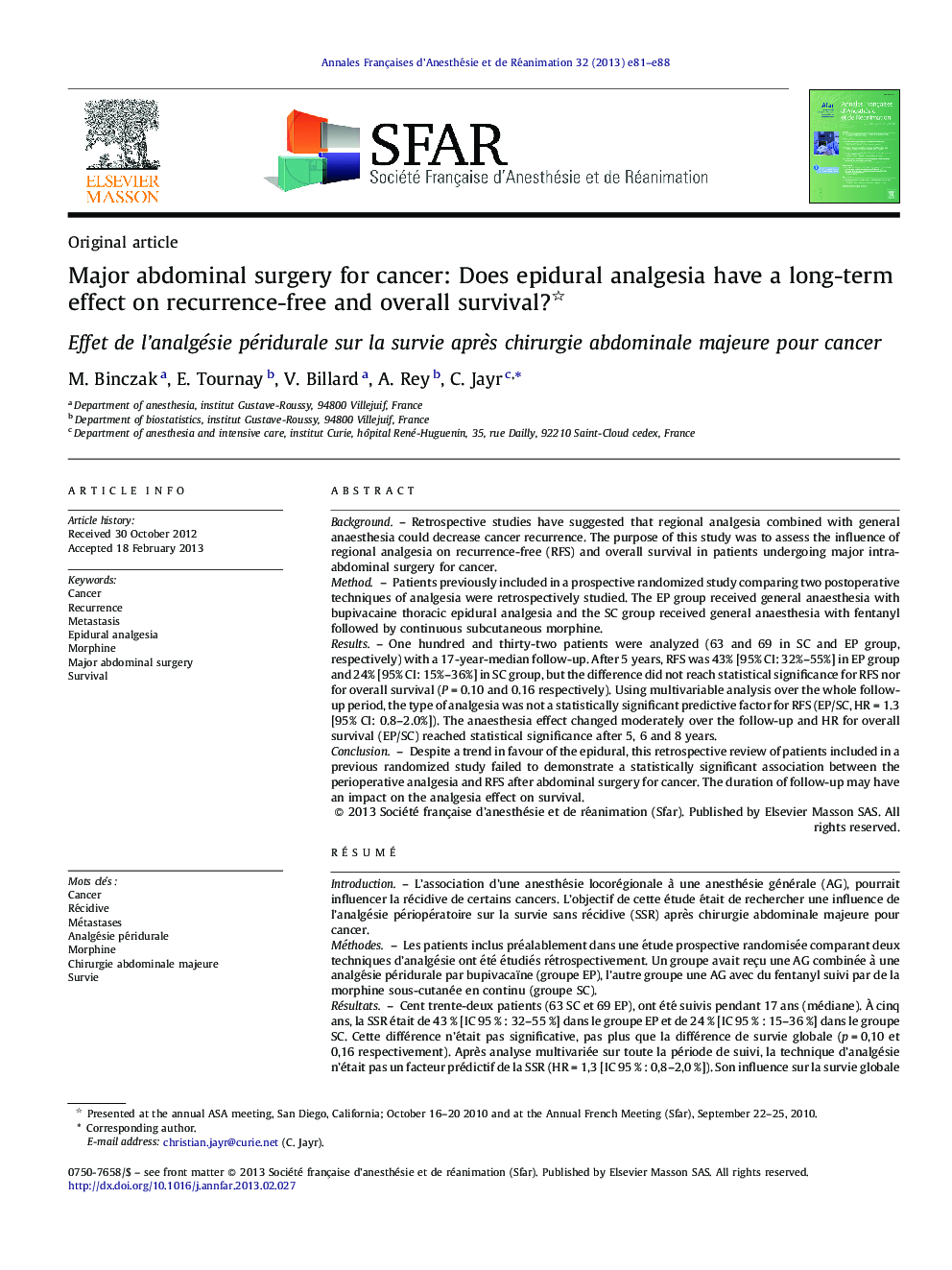| کد مقاله | کد نشریه | سال انتشار | مقاله انگلیسی | نسخه تمام متن |
|---|---|---|---|---|
| 2745535 | 1148839 | 2013 | 8 صفحه PDF | دانلود رایگان |

BackgroundRetrospective studies have suggested that regional analgesia combined with general anaesthesia could decrease cancer recurrence. The purpose of this study was to assess the influence of regional analgesia on recurrence-free (RFS) and overall survival in patients undergoing major intra-abdominal surgery for cancer.MethodPatients previously included in a prospective randomized study comparing two postoperative techniques of analgesia were retrospectively studied. The EP group received general anaesthesia with bupivacaine thoracic epidural analgesia and the SC group received general anaesthesia with fentanyl followed by continuous subcutaneous morphine.ResultsOne hundred and thirty-two patients were analyzed (63 and 69 in SC and EP group, respectively) with a 17-year-median follow-up. After 5 years, RFS was 43% [95% CI: 32%–55%] in EP group and 24% [95% CI: 15%–36%] in SC group, but the difference did not reach statistical significance for RFS nor for overall survival (P = 0.10 and 0.16 respectively). Using multivariable analysis over the whole follow-up period, the type of analgesia was not a statistically significant predictive factor for RFS (EP/SC, HR = 1.3 [95% CI: 0.8–2.0%]). The anaesthesia effect changed moderately over the follow-up and HR for overall survival (EP/SC) reached statistical significance after 5, 6 and 8 years.ConclusionDespite a trend in favour of the epidural, this retrospective review of patients included in a previous randomized study failed to demonstrate a statistically significant association between the perioperative analgesia and RFS after abdominal surgery for cancer. The duration of follow-up may have an impact on the analgesia effect on survival.
RésuméIntroductionL’association d’une anesthésie locorégionale à une anesthésie générale (AG), pourrait influencer la récidive de certains cancers. L’objectif de cette étude était de rechercher une influence de l’analgésie périopératoire sur la survie sans récidive (SSR) après chirurgie abdominale majeure pour cancer.MéthodesLes patients inclus préalablement dans une étude prospective randomisée comparant deux techniques d’analgésie ont été étudiés rétrospectivement. Un groupe avait reçu une AG combinée à une analgésie péridurale par bupivacaïne (groupe EP), l’autre groupe une AG avec du fentanyl suivi par de la morphine sous-cutanée en continu (groupe SC).RésultatsCent trente-deux patients (63 SC et 69 EP), ont été suivis pendant 17 ans (médiane). À cinq ans, la SSR était de 43 % [IC 95 % : 32–55 %] dans le groupe EP et de 24 % [IC 95 % : 15–36 %] dans le groupe SC. Cette différence n’était pas significative, pas plus que la différence de survie globale (p = 0,10 et 0,16 respectivement). Après analyse multivariée sur toute la période de suivi, la technique d’analgésie n’était pas un facteur prédictif de la SSR (HR = 1,3 [IC 95 % : 0,8–2,0 %]). Son influence sur la survie globale variait modérément au cours du temps avec un effet bénéfique statistiquement significatif à cinq, six et huit ans de suivi.ConclusionMalgré une tendance à un bénéfice de l’analgésie péridurale sur la survie, cette analyse ne montre pas de différence significative entre les modes d’analgésie utilisés, après chirurgie abdominale pour cancer. La durée du suivi pourrait avoir un impact sur l’analyse du bénéfice de l’analgésie.
Journal: Annales Françaises d'Anesthésie et de Réanimation - Volume 32, Issue 5, May 2013, Pages e81–e88